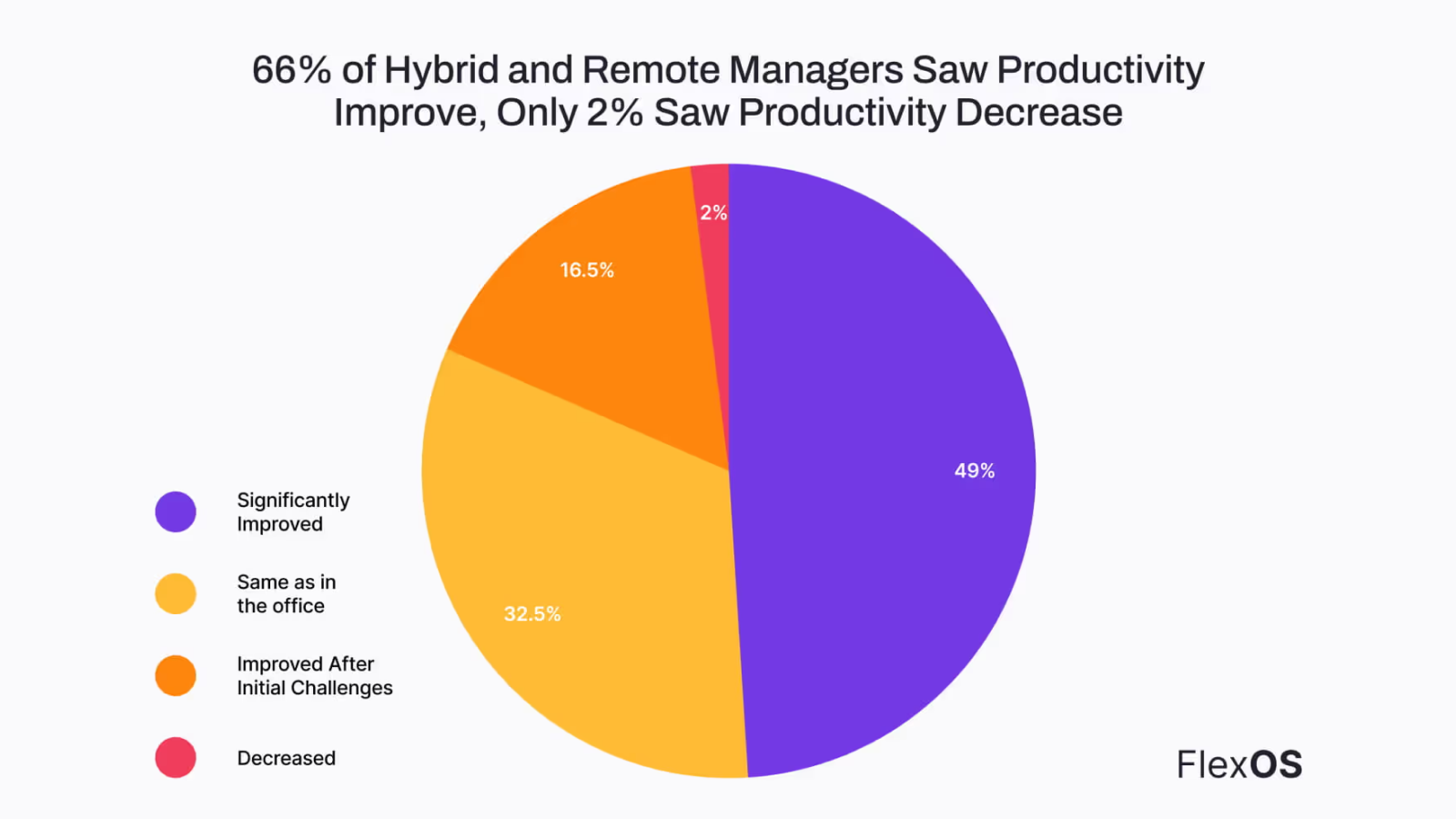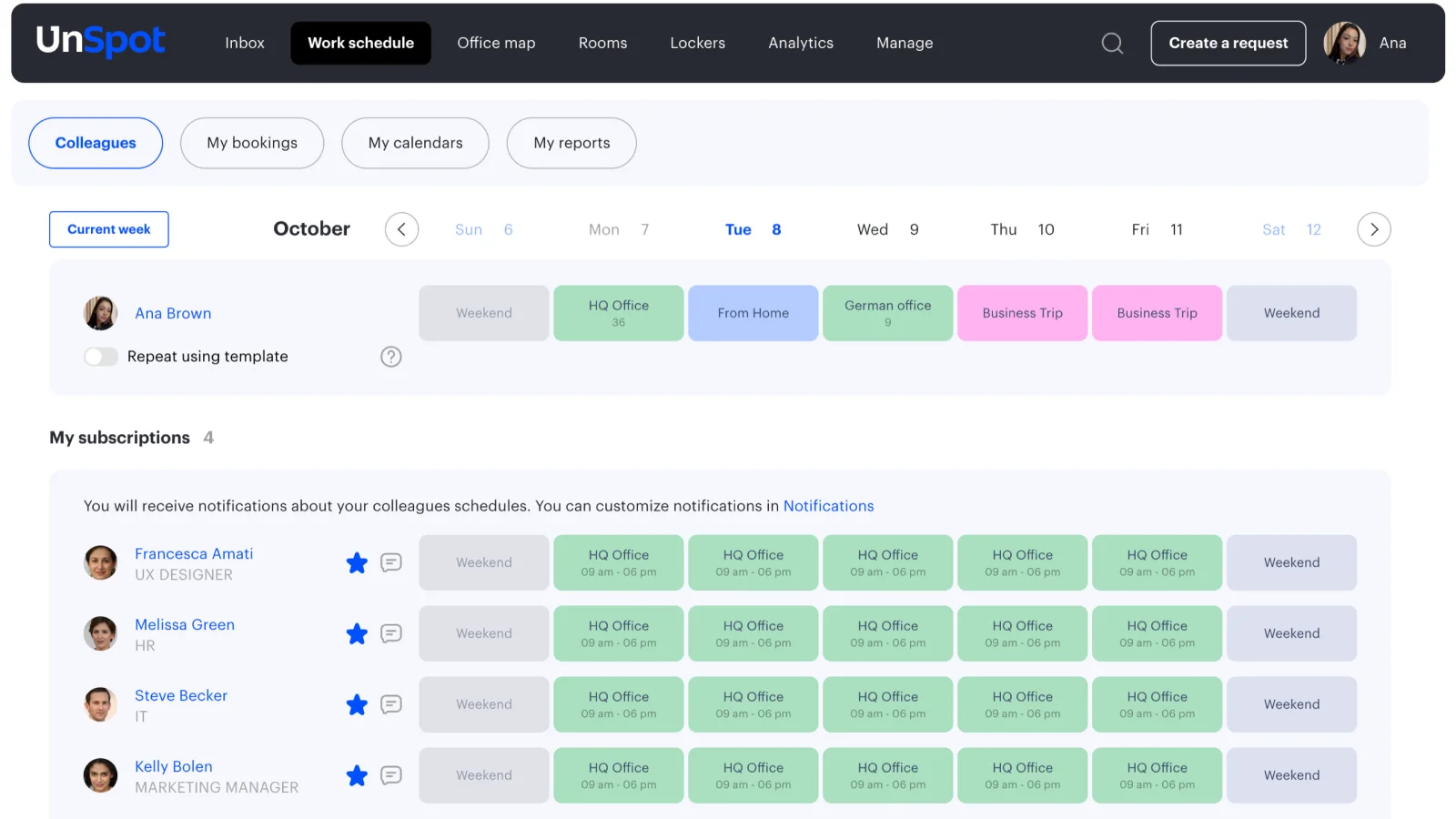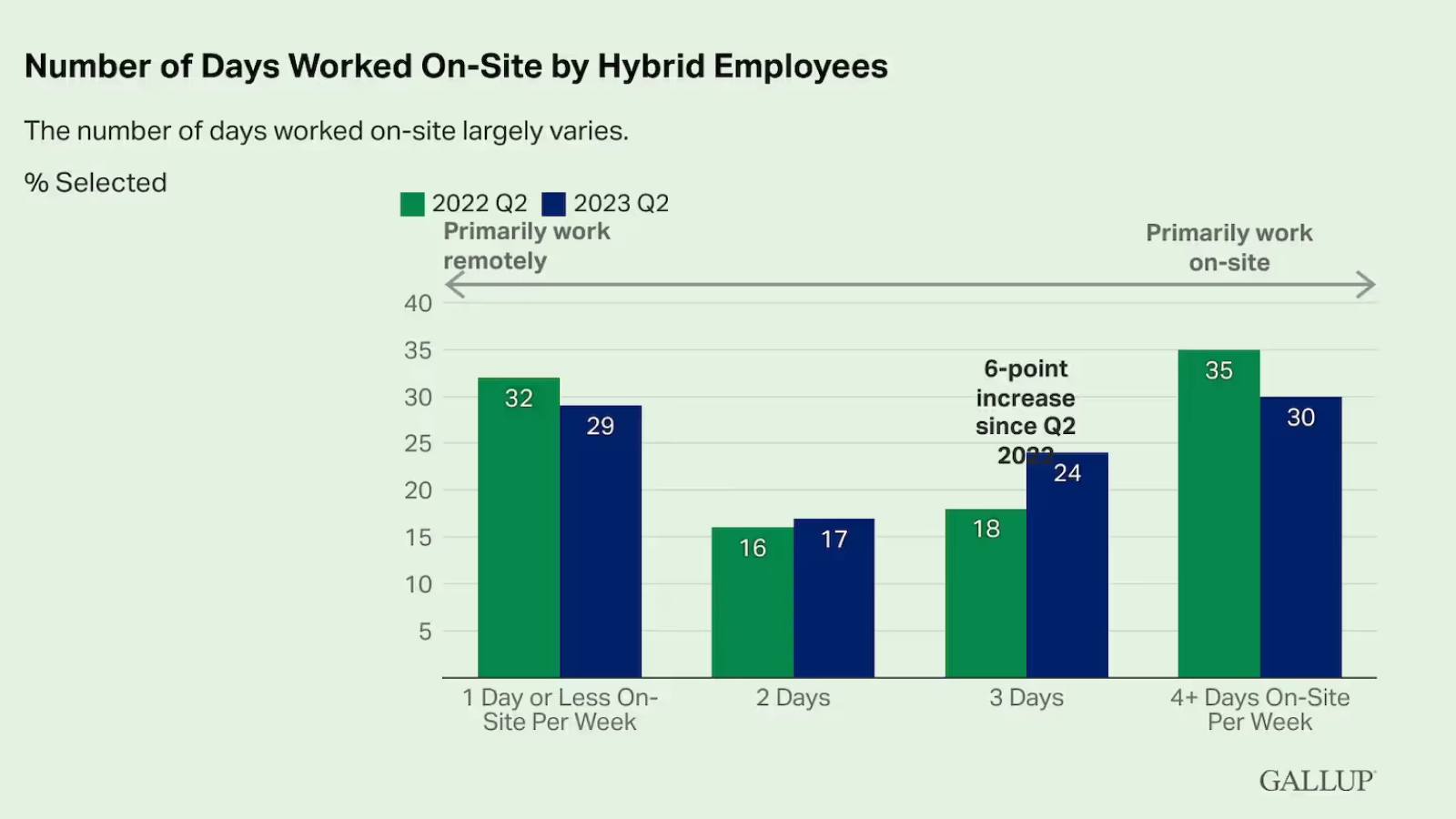In today's rapidly evolving professional landscape, hybrid work is not just a trend — it is becoming the new normal, shaping business processes, work patterns, work culture, as well as employee convenience and loyalty to the company.
This article explores the benefits of a hybrid work model, the challenges companies face, and best practices for implementing this format effectively. Discover how the hybrid model can revolutionize not only workspaces but also employees' lives.
What Is a Hybrid Work Model?
Hybrid work is an employment model that combines in-office work with remote work from home or any other convenient location for the employee, reflecting the flexibility of hybrid setups. This format merges the benefits of remote and on-site work, offering increased productivity, improving work-life balance, and maintaining team collaboration and corporate culture.
Research shows that hybrid models benefit both employees and employers. For instance, Gallup's latest data reveals that six in ten workers with remote options prefer a hybrid setup — a number that's only expected to grow.

Here’s what’s happening now: according to FlexOS, 66% of executives reported productivity gains, with 49% noting significant improvements. The remaining opinions were distributed as follows: 32.5% stated that their productivity is location-independent, about 16.5% reported improved productivity after overcoming initial challenges, and only 2% reported a decline in their productivity.

Key Benefits of Hybrid Work
Cost Savings for Employees and Companies
Hybrid work significantly reduces costs for both employees who are working remotely and employers, demonstrating the financial advantages of this format. Employees save on commuting expenses such as gas, public transportation, or parking, as well as on lunches and maintaining a professional wardrobe. According to Owl Labs' 2023 Hybrid Work Report, commuting to the office costs employees an average of $51 per day.
For companies, the savings are even more significant: research by Global Workplace Analytics has shown that hybrid working can save organisations more than $11,000 per employee a year on average.

Work-Life Balance
Hybrid work allows employees to work more efficiently, plan their day productively, and save commuting time, showcasing the key benefits of flexible work arrangements. Some companies combine this format with flexible hours, allowing employees to choose when they work. This gives them more time for family, hobbies, and relaxation, improving mental health and motivation. For example, in the morning, they can go for a jog or read instead of commuting, and in the evening, spend quality time with family without the stress of rush-hour travel.
Improving Personal Productivity
The hybrid work model allows employees to focus on important work tasks from the comfort of their homes, making it easier to achieve optimal work conditions. Collaborative work and discussions can be scheduled for days spent in the office. This personalized approach enhances overall productivity. According to FlexOS data, 66% of managers report an increase in productivity, with nearly half noting significant improvements.

Catering to Employee Preferences
One of the key advantages of hybrid work is its ability to adapt to individual employee preferences. Companies often require employees to be in the office 2-3 days a week, while allowing them to choose which days to work on-site and which to work from home. This flexibility enables companies to accommodate the diverse needs and work styles of each employee.
Tax deductions for home office furnishings
Hybrid employees who primarily work from home and rarely travel to the office can take advantage of tax deductions for expenses related to home office furnishings. These can be:
- Electricity, internet and heating costs that have gone up because of working from home.
- The purchase of equipment such as a computer, furniture or specialized machinery.
- For example, in Germany, employees can deduct up to €6 for each working day spent at home, but no more than €1,260 per year. This helps to offset the additional costs associated with hybrid work.
Challenges of Hybrid Work
Communication Gaps
When part of the team works in the office and others choose to work from home, effective communication can become challenging, highlighting one of the biggest challenges of this model. Employees who work remotely most of the time may miss out on spontaneous meetings or informal idea discussions that happen in the office.
Solution: Use tools like Slack, Microsoft Teams, and Zoom. These platforms make it easy to include remote employees in discussions with just a couple of clicks.
Coordination and Scheduling Conflicts
Coordinating office visits for all employees can be a complicated task, especially for companies with more than 200 employees. Some might miss important meetings or face challenges working together because they struggle to align schedules with their colleagues.
Solution: Use scheduling software instead of the manual approach typically handled by office managers or administrators. Employees will be able to plan their office visits for a week or a month in advance in just one minute. They will also be able to view their colleagues' schedules to choose a day when the needed coworker will be in the office.

Burnout and Work-Life Boundaries
Working from home makes it harder for employees to work within set boundaries, often blurring personal and professional time. While those working from the office often leave work on time, remote employees might overwork, leading to fatigue, stress, and eventually burnout.
Solution: Encourage employees to set clear work hours and take regular breaks. Managers should set an example by avoiding sending emails or messages outside of work hours. Additionally, companies can offer wellness programs to help employees relax and maintain their health.
Dependence on Technology and Infrastructure
Hybrid work heavily relies on technology. Employees need a reliable internet connection, secure access to company systems, and the necessary tools to perform their tasks effectively. Without these, productivity can suffer.
Solution: Replace stationary office computers with corporate laptops equipped with licensed software tailored to each employee's specific needs. Set up a reliable IT support service that employees can contact for assistance if any issues arise.
Maintaining Corporate Culture
When employees rarely see each other in person, it becomes harder to feel like part of a team. Those who visit the office infrequently may feel disconnected from their colleagues or the organization.
Solution: Regularly organize team-building activities, both online and offline, where achievements of individual employees are celebrated, highlighting their importance to the team's overall success. Leaders should do this consistently to ensure every employee feels like a valued member of the team.
Unique Benefits for Specific Groups
👩🎓 More time to yourself for modern women
A flexible schedule allows women to adapt their work to personal and professional priorities. For example, they can come to the office only for important meetings while working from home the rest of the time. This approach reduces commute time and saves up to 10 hours a week. These valuable hours can be dedicated to activities often overlooked in the daily rush, such as fitness, reading, personal growth, or simply relaxing.
⚖️ The Perfect Balance for Young Parents
For parents with young children, the hybrid model is a true lifesaver, enabling them to balance a career with family responsibilities. Remote workdays allow parents to stay close to their children — preparing meals, helping with schoolwork, and being present for important milestones like witnessing their child’s first steps. Meanwhile, office workdays help parents focus on their tasks, leaving household responsibilities behind for a while.
🛋️ A Comfortable Environment for People with Chronic Illnesses or ADHD
Individuals dealing with health challenges value the hybrid model for its ability to provide a comfortable and flexible workspace. Working from home helps them avoid physical strain, stressful commutes, and adapt their work environment to their specific needs. While these employees often have more remote workdays, their in-office days remain crucial for engaging with colleagues and addressing team tasks.
♿️ Inclusivity for People with Disabilities
Hybrid or fully remote work breaks down barriers for employees with disabilities. It allows them to work from home without the challenges of commuting or relocating while maintaining high productivity. These employees may visit the office once or twice a month to stay connected with the team and keep up with office updates.
Optimizing the Hybrid Work Environment in 3 Steps
As hybrid work continues to grow in popularity, its success hinges on the right strategies. To create an environment that benefits both employees and companies, consider these three key optimization steps ⬇️
1. Invest in Tools for Work and Collaboration
The tools used in a hybrid work model are divided into two types:
Collaboration tools — these include video conferencing platforms, messaging apps, cloud storage, shared workspaces, and project management tools. Examples of such tools are Zoom and Microsoft Teams for video calls and meetings, Slack for chats and quick communication, Google Workspace and Microsoft OneDrive for collaborative document editing, Miro and Figma for team work on visual projects, and Jira, Asana, and Trello for project planning, task tracking, and team coordination.
Hybrid management tools — these are systems for scheduling office visits, booking workstations and meeting rooms, analyzing office occupancy, and tracking employee attendance. They help make the hybrid format manageable, eliminating confusion and issues that arise when a company tries to oversee everything through the HR department, office managers, or department heads.
Make sure your company utilizes the full range of programs and tools to seamlessly transition to a hybrid work model or, if it is already in place, to manage it effectively.

3. Hold Regular Meetings and Maintain Communication
Regular meetings are essential in a hybrid work environment to maintain team cohesion and ensure effective communication, supporting the adoption of hybrid practices. They provide structured opportunities for employees to connect, share updates, and collaborate, bridging the gap between remote and in-office staff. This consistent interaction fosters a unified company culture, enhances productivity, and reduces feelings of isolation among remote workers.
2. Balance Office and Remote Work
A hybrid model should accommodate employee preferences. Some thrive at home, while others value in-person meetings. The best approach is to offer flexibility. Gallup research reveals that 4 in 10 hybrid employees can set their own office schedules. Specifically, 31% have full autonomy in choosing their office days each week, while another 10% are encouraged (but not required) to follow guidelines.

The Future of Work and Hybrid Workplaces by 2025
Hybrid work format is becoming a key model of modern labor and will continue to evolve by 2025. Companies and employees alike are adapting to a landscape where flexibility and technological support are the cornerstones of success. The future of hybrid work in 2025 will be shaped by several key trends.
Trend 1: Greater Flexibility and a Personalized Approach
According to Gartner research, 82% of executives plan to implement more flexible work options, responding to the growing landscape of hybrid work demands. This shift is driven by employee demand for personalization: people want to decide when and where they work best. For example, employees with children often prefer more time working from home, while younger workers value in-person interactions at the office. This tailored approach ensures that the needs of different groups are met while maintaining overall efficiency.
Trend 2: Technology as the Backbone of Hybrid Work
Technology plays a pivotal role in the future of work. Platforms like Zoom, Microsoft Teams, and Slack have become standard tools for seamless collaboration. Additionally, McKinsey research shows that 74% of companies are investing in digital infrastructure to support remote teams. This includes cloud storage systems, project management tools, and virtual workspaces. Without these technologies, hybrid work would not be feasible.
Trend 3: The Growing Importance of Employee Well-Being
Hybrid work is closely tied to health and well-being. Employees increasingly value companies that help them find balance between work and personal life. According to Deloitte, 70% of workers believe it’s essential for hybrid schedules to account for their mental and physical health. This might include extra time for rest, access to mental health resources, and compensation for setting up a home office.
Trend 4: The Integration of AI
With the rise of AI and neural networks, employees can obtain answers to questions or generate new ideas directly from AI tools instead of holding endless meetings or brainstorming sessions. This trend significantly reduces the number of meetings, which previously disrupted focus both in the office and during remote work, allowing teams to work more efficiently and productively.
Main Thing on Hybrid Work Benefits
- Hybrid working combines office and remote formats, offering employees flexibility in where they work.
- Technologies like Zoom, Microsoft Teams and UnSpot are the backbone of an effective hybrid work model.
- Work-life balance is achieved through the hybrid format, allowing employees to spend more time on family and hobbies, reducing stress and improving quality of life.
- Key challenges of hybrid working include the complexities of communication, maintaining company culture and trust, which companies are addressing through regular meetings, digital tools and inclusive approaches.
FAQs on Hybrid Work Benefits
What are the pros and cons of a hybrid work schedule?
- Flexibility: Greater work-life balance with control over schedules and work locations.
- Cost Savings: Lower commuting costs for employees and reduced office expenses for businesses.
- Productivity: Focused, distraction-free work at home and effective collaboration during in-office days.
- Employee Satisfaction: Increased autonomy and flexibility boost morale and retention.
- Access to Talent: Companies can hire globally without requiring relocation.
Cons of Hybrid Work:
- Communication Gaps: Remote employees may feel left out of discussions and decision-making.
- Weakened Culture: Reduced face-to-face interactions can harm team cohesion and relationships.
- Leadership Challenges: Monitoring productivity and supporting employee well-being becomes more complex.
- Technical Reliance: Dependence on stable technology and employees’ digital proficiency.
- Equity Issues: Proximity bias may lead managers to favor in-office staff over remote workers.
What are the 5 C's of hybrid work?
- Communication: Clear, consistent information sharing across teams.
- Collaboration: Seamless teamwork irrespective of location.
- Connection: Maintaining a sense of belonging and team dynamics.
- Culture: Upholding organizational values and engagement.
- Coordination: Clear rules, schedules, and expectations for hybrid workflows.
Are hybrid workers happier?
What are the negatives of hybrid working?
- Isolation: Remote workers may feel disconnected from the team.
- Workflow Gaps: Coordinating efforts across locations can be difficult.
- Leadership Challenges: Harder to identify burnout or underperformance.
- Technical Dependence: Requires reliable infrastructure that can fail.
- Equity Concerns: Unequal access to resources and recognition.







